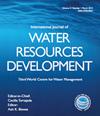ngo在中国水治理中的持续公众参与:“双嵌入”理论框架下的“民间河长”案例分析
IF 2.2
3区 环境科学与生态学
Q3 WATER RESOURCES
International Journal of Water Resources Development
Pub Date : 2022-02-25
DOI:10.1080/07900627.2022.2034601
引用次数: 6
摘要
虽然公众参与对成功的环境治理至关重要,但在中国,公众参与是零星和分散的。本文通过对中国南方城市深圳和广州的深入访谈,探讨了环保非政府组织(ENGOs)如何将“平民河长”项目作为水治理的新途径。我们提出了一个“双重嵌入”的框架,在这个框架内,非政府组织建立了政治和社会合法性、互惠性和网络,使他们能够持续参与水治理。我们的研究结果表明,国家-社区-非政府组织关系的新模式是理解中国未来环境治理中公众参与的关键。本文章由计算机程序翻译,如有差异,请以英文原文为准。
Explaining the sustained public participation of ENGOs in China’s water governance: a case study of the ‘civilian river chiefs’ under the theoretical framework of ‘double embeddedness’
ABSTRACT Although essential to successful environmental governance, public participation has been sporadic and fragmented in China. Drawing on in-depth interviews conducted in the southern Chinese cities of Shenzhen and Guangzhou, this paper explores how environmental non-governmental organizations (ENGOs) have carried out ‘civilian river chiefs’ projects as novel approaches to water governance. We propose a framework of ‘double embeddedness’, within which ENGOs have built political and social legitimacy, reciprocity, and networks that enable their sustained participation in water governance. Our findings suggest that new patterns of state–community–non-governmental organization relationships are key to understanding public participation in China’s future environmental governance.
求助全文
通过发布文献求助,成功后即可免费获取论文全文。
去求助
来源期刊
CiteScore
8.10
自引率
9.70%
发文量
23
审稿时长
1 months
期刊介绍:
International Journal of Water Resources Development is a policy and practice-oriented Journal that covers all aspects of water resources policy, management, development and governance. It is an interdisciplinary journal that focuses on water resources and their economic, financial, social and environmental-related impacts. Contributions which include the interdependences and inter-linkages between the water and the agricultural, energy, industrial and health sectors in both developed and developing countries, both at present and in the future, are welcome.

 求助内容:
求助内容: 应助结果提醒方式:
应助结果提醒方式:


